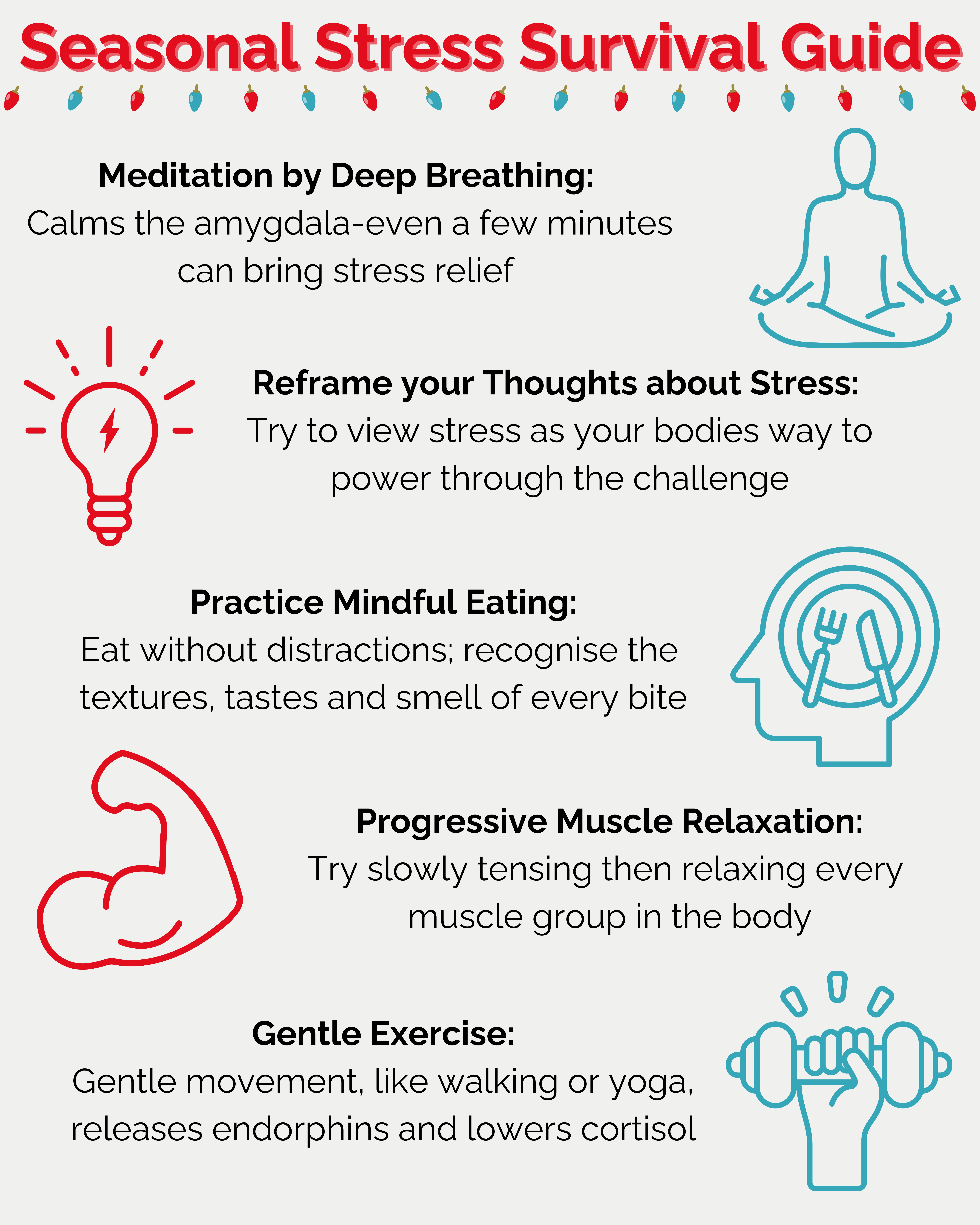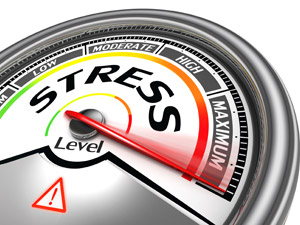This time of year can drastically increase your stress levels. Christmas to-do lists, holiday planning, and the inevitable surge in festive foods can feel overwhelming. It’s also easy to let exercise and good habits slip, which only adds to the tension! Here’s a little about how stress can impact your weight and some practical steps to stay in control so that you can end the year feeling your best.
The impact of stress on weight loss
Stress is often overlooked when it comes to weight loss, yet it plays a powerful role in shaping our eating habits and overall health. When stressed, the body releases cortisol, a hormone that not only influences our cravings but can also increase our appetite for sweet and high-calorie foods.
Studies have shown that people who experience frequent stress tend to choose energy-dense, carbohydrate-heavy snacks as a quick way to soothe their nerves and boost serotonin, which helps calm cortisol levels.
The challenge? This tendency to reach for comfort foods in stressful times can quickly lead to weight gain and interfere with healthy eating habits. And, as cortisol levels remain elevated, it can weaken our willpower, making it harder to resist cravings. In the long run, this cycle of stress and stress eating may lead to insulin resistance and metabolic shifts that impact weight management. All this means stress management is more than just a “nice to have” — it’s essential to helping your Slimpod programme work optimally.
Why stress eating happens
Research has given us a clearer picture of why stress eating often leads us to specific foods. Foods high in carbs, sugars, and fats stimulate serotonin, the calming hormone, which counteracts the effects of cortisol and offers a temporary mood boost.
One study even showed that in stressful situations, people are likely to choose higher-calorie foods, which can be especially hard to resist when under pressure. If stress becomes chronic, our regular intake of these comfort foods can lead to increased insulin levels, driving more hunger, more eating, and weight gain.
And here’s something else that’s interesting: our body’s reaction to stress can even affect our quality of sleep, which we know is vital for weight loss and overall health. When we’re sleep-deprived, our bodies crave more food, especially carbs and sugars, as a way of boosting flagging energy levels.

How to manage stress-related weight gain
The great news? There are several effective ways to counteract the effects of stress and regain control over your eating habits and lifestyle. Here are some of the most effective techniques to help you reduce stress and keep your weight goals on track:
1. Meditation or deep breathing: Meditation can have a huge impact on reducing stress by helping to calm the amygdala, the brain’s “fight-or-flight” centre. Even a few minutes of deep breathing can bring relief in stressful moments.
If you’re new to meditation, try to include just two minutes of focused breathing each day, such as when you’re waiting for the kettle to boil. Apps like Calm or Headspace can help you get started, or simply take deep breaths in and out, letting your body relax.
2. Reframe your thoughts about stress: We can’t always avoid stress, but changing our view of it can help. Studies show that if you view stress as a motivating challenge rather than an overwhelming barrier, your body will have a more manageable response.
So, when stress hits, try thinking of it as your body’s way of giving you a bit of energy to help you power through the challenge!
3. Practise mindful eating: Mindless eating is a common response to stress. But being fully present at mealtimes can be a game-changer. Try eating without distractions, putting away your phone and switching off the TV. Notice the textures, tastes, and smells of each bite. You’ll likely find you need less food to feel satisfied when you tune into what you’re eating.
4. Progressive muscle relaxation: This is a great technique to try before bedtime. It involves slowly tensing, then relaxing, each muscle group in the body, which can release tension built up over the day. Not only does this help you unwind physically, but it also improves sleep quality, a crucial factor for effective weight loss and stress management.
5. Gentle exercise: You don’t have to hit the gym to benefit from exercise. Gentle movement, like a 10-minute walk or a yoga session, releases endorphins and lowers cortisol, easing stress and helping to improve your overall mood. Yoga can also help you practise deep breathing and mindfulness, combining multiple stress-reducing techniques in one.

Final thoughts
We’re all unique in the way we respond to stress, so finding what works best for you is key. Trying each of these methods for a week or so and noticing how you feel can be a great way to find your personal toolkit for stress management. By reducing stress, you’ll not only improve your well-being but also help Slimpod do its best work, supporting you on your path to a healthier, more resilient you this season.
So, right now,choose self-care as your top priority. Give yourself the gift of calm and watch as the benefits ripple through every part of your life, from how you feel to the choices you make.





7 thoughts on “Your seasonal stress survival guide”
just got onto the track, looking forward to the journey ahead x
This is just what I needed to read. Hopefully I can now own it and stop it ruining my success so far! Over 5% body weight lost. Roll on the Spring …
Really useful information, easy to do, simple and well explained, thank you!
1. Very welcome and timely message. Would enjoy more like this please.
2. Could Trevor or Sandra make a pod which leads you through progressive muscle relaxation?
Good reminder for surviving the next few months
impacts of stress!
I am going to practice these techniques for the rest of this week and next. I have my 4th round of surgery next week (pre op was yesterday) and anxiety levels have shot through the roof. I should be used to this by now as I know the process inside out. The surgeon is brilliant,the hospital and staff are brilliant,it is just me who isn’t!!
This has reminded me that MY self-care is a top priority and only I can make it happen. So, I’m going to starting with trying meditation. 🧘♀️